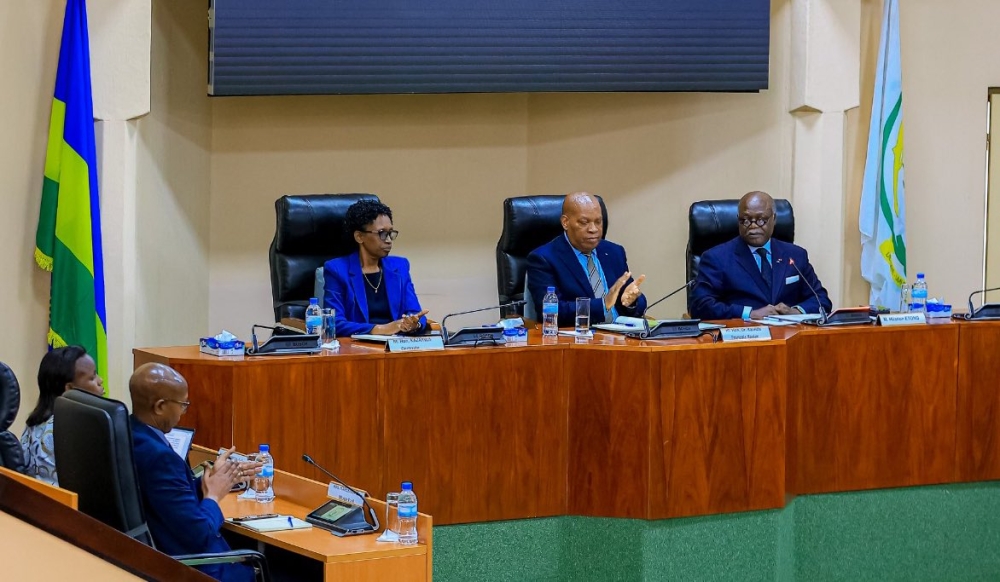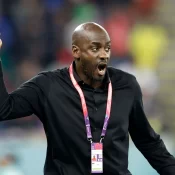
La Francophonie Assembly expects that the situation in eastern DR Congo can be resolved through parliamentary diplomacy
Hilarion Etong, the president of the Parliamentary Assembly of La Francophonie (APF), has voiced hope that the creation of an interparliamentary committee comprising Rwandan and Congolese lawmakers will help support initiatives aimed at achieving a long-term resolution to the conflict in eastern Democratic Republic of the Congo.
On Wednesday, May 28, while his group was touring the Rwandan Parliament, he made the comment.
The visit was consistent with APF’s “good offices” parliamentary mission, which supports efforts to find long-term solutions to the conflicts in eastern Democratic Republic of the Congo. This strategy contributes to the APF’s goal of encouraging communication, harmony, democratic government, human rights, and unity among its members.
The APF mission is “of great importance to us,” according to Rwanda’s Senate President François-Xavier Kalinda, because it advances parliamentary diplomacy, bilateral collaboration, peace, and security in the enormous Lakes area.
Following their visit to DR Congo, the APF delegation traveled to Rwanda. Both states are part of the French-speaking nations’ organization, La Francophonie.
According to Etong, “the will for peace is manifested” in both Rwanda and the Democratic Republic of the Congo, and they listen to both sides in the framework of the good offices mission.
Regarding the impact of the talks, he stated, “We cannot yet say that we have come to a conclusion,” but “tendency seems to go towards the establishment of an inter-parliamentary committee [of] the Rwandan and Congolese parliamentarians who can meet and exchange ideas, sometimes in Kigali, sometimes in Kinshasa.”
According to Kalinda, the conflict in the eastern Democratic Republic of the Congo is among the most intricate and enduring in Africa.
Kalinda stated that a confluence of historical, political, economic, identity, and geostrategic elements contribute to the conflict’s profound origins. According to him, these profound reasons are simultaneously connected to colonial past, the fallout from the 1994 genocide against the Tutsi, identity and border conflicts, the frailty of governmental institutions, and the lack of effective governance.
He claimed that in terms of colonial heritage, Belgian colonialists left behind a politically unstable society with arbitrary borders and no sense of national cohesion.
“In the east of the Democratic Republic of the Congo, there is a historical competition between local communities centered around land issues and nationality, and power,” Kalinda said, adding that ethnic divisions have been exploited to favor some communities at the expense of others, thereby causing mistrust and tensions.
“Ethnic hatred and violence are fueled by the regular stigmatization and perception of certain communities, like the Congolese Tutsi, as foreigners,” Kalinda stated.
“Hundreds of thousands of refugees, including the genocidaires, settled in the east of DR Congo after the genocide against the Tutsi in Rwanda in 1994 and regrouped in a militia called FDLR,” he told the visiting team. This armed group has consistently caused ongoing problems in the region by exploiting the east of the Democratic Republic of the Congo as a rear base to destabilize Rwanda.
“It should be noted that the Congolese state does not exercise real control over the east of the country, leaving a security vacuum exploited by more than 250 active armed groups,” he stated, referring to the lack of state governance and the fragility of official institutions.
The populace is more vulnerable as a result of corruption, the army’s instrumentalization, and a lack of public services.
“Rwanda continues to condemn the FDLR’s active presence, which continues to operate in DR Congo with the assistance of the Congolese armed forces despite being classified as a terrorist organization by the United Nations, the African Union, and the European Union,” he said.
He claimed that the crisis in the east of DR Congo “has been purposefully misinterpreted, reduced to unfounded accusations against Rwanda, including allegations of illegal exploitation of natural resources and of expansionist aims,” as a result of the Congolese government and the international community ignoring the conflict’s fundamental causes.
The situation deteriorated when the M23 rebels returned in November 2021 and the Congolese government refused to carry out the 2023 Nairobi proclamation.
“Rwanda has consistently demanded a political resolution. This includes the neutralization of FDLR, the removal of foreign forces from the DR Congo’s military coalition, and direct negotiations between the Congolese government and M23 to address the conflict’s root causes, Kalinda said.
He went on to say, “Rwanda needs long-term security guarantees along its border with DR Congo.”
All Categories
Recent Posts
Tags
+13162306000
zoneyetu@yahoo.com



